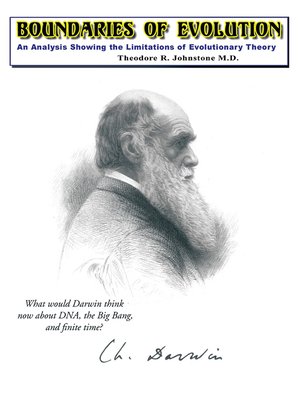Boundaries of Evolution
ebook ∣ What Would Darwin Think Now About DNA, the Big Bang, and Finite Time?
By Theodore R. Johnstone M.D.

Sign up to save your library
With an OverDrive account, you can save your favorite libraries for at-a-glance information about availability. Find out more about OverDrive accounts.
Find this title in Libby, the library reading app by OverDrive.



Search for a digital library with this title
Title found at these libraries:
| Loading... |
Boundaries of Evolution describes the unlikelihood of evolutionary theory to explain how it is supposed to scale three major biological cliffs. The first cliff is the need for a logical explanation of how random chemical reactions could produce the first living cell from the primordial soup. The second is the problem of explaining how the first single-celled eukaryote evolved from a prokaryote. Mathematical improbabilities of evolutionary theory to scale the first two cliffs, in the time available, are demonstrated. The third insurmountable cliff is the necessity for a reasonable explanation of how millions of different kinds of multi-celled eukaryotes could have quickly evolved from single-celled eukaryotes.
Random mutations occurring in DNA, accepted or rejected by natural selection, are hailed as the source of advancement for the increase in biotic complexity. The most common time for mutations to occur in the DNA is during replication. Therefore, evolutionary advancement should occur faster in biota with the most frequent replication cycles. If both evolutionary theory and the fossil record are correct, prokaryotes, which replicate in as little as 20 minutes took 2 billion years to evolve the first single-celled eukaryote. Single-celled eukaryotes, generally having shorter reproductive times than multi-celled eukaryotes, took another billion years to evolve the first multi-celled eukaryote. Then during Cambrian times, the multi-celled eukaryotes with the longest reproductive cycles literally exploded in diversity in a comparatively short time. How could this be? Other inadequacies of Darwin's theory are presented for everyone to see.
Random mutations occurring in DNA, accepted or rejected by natural selection, are hailed as the source of advancement for the increase in biotic complexity. The most common time for mutations to occur in the DNA is during replication. Therefore, evolutionary advancement should occur faster in biota with the most frequent replication cycles. If both evolutionary theory and the fossil record are correct, prokaryotes, which replicate in as little as 20 minutes took 2 billion years to evolve the first single-celled eukaryote. Single-celled eukaryotes, generally having shorter reproductive times than multi-celled eukaryotes, took another billion years to evolve the first multi-celled eukaryote. Then during Cambrian times, the multi-celled eukaryotes with the longest reproductive cycles literally exploded in diversity in a comparatively short time. How could this be? Other inadequacies of Darwin's theory are presented for everyone to see.






